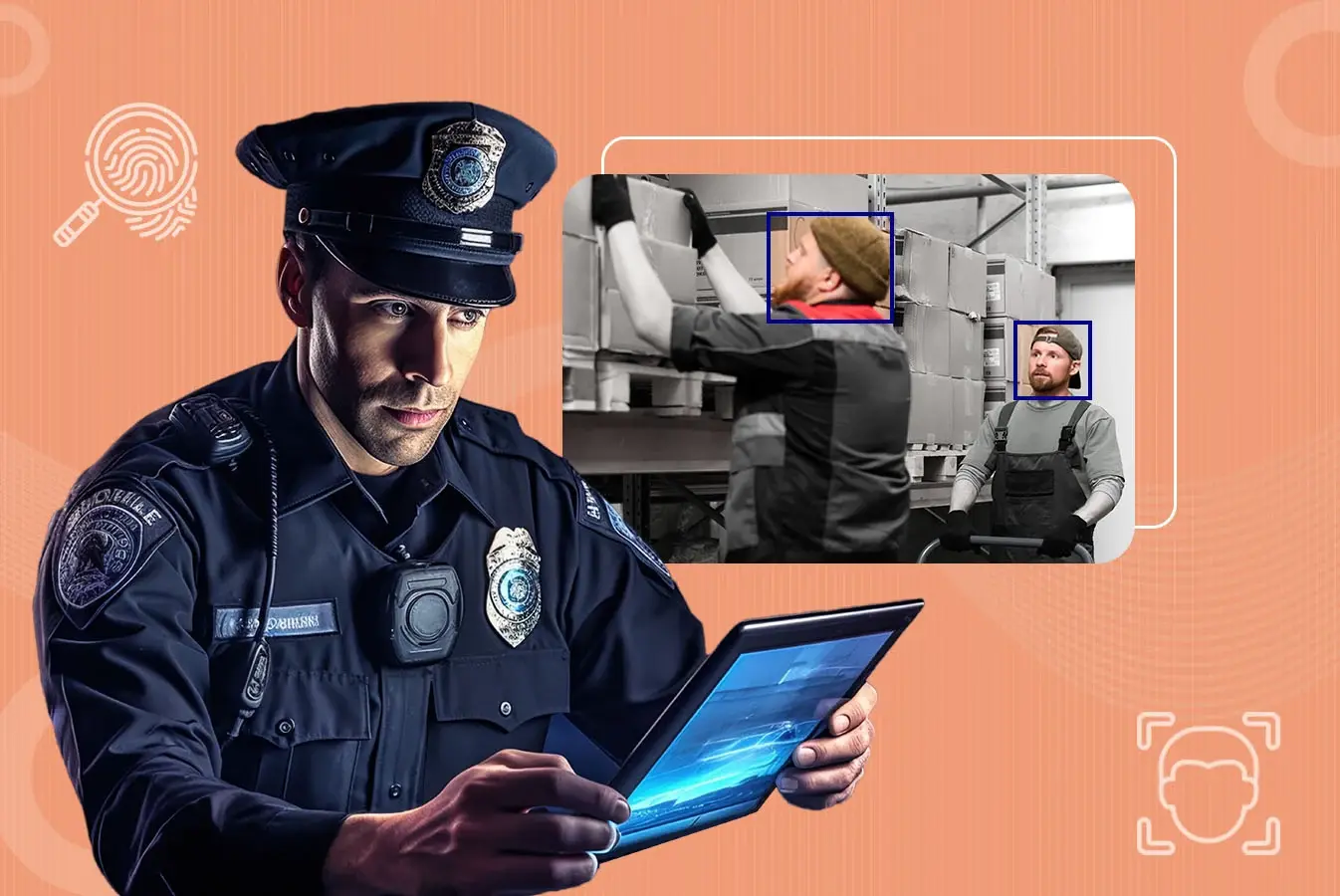Facial recognition search is becoming an essential technology in the contemporary world. The popularity of the technology can be seen from a survey of U.S adults. Eighty-six percent of the people surveyed have heard about facial recognition technology. It is increasingly being used in the field of law enforcement. Facial recognition search allows detection of a face and recognition using a set of pre-stored images in a database. The question that arises and the question that will be addressed in the scope of this article is as follows: In today's world, how can law enforcement agencies use the technology behind facial recognition search to tackle crimes?
How Facial Recognition Technology Works
.png?width=1200&name=shutterstock_1376790440%20(1).png)
The technology behind facial recognition software works by using nodal points in a human’s face, which are then converted to a code and compared against a database to find the closest match. The process behind facial recognition can be divided into three steps:
- Detection: The process of finding a face in any image.
- Analysis: This is the step where data in the form of Faceprint is created and stored. The most common way to map the face is by finding the distance between the corner of the right eye and the corner of the left eye. The distances between various facial features are calculated and the data is stored in the form of numbers. The interesting phenomenon is that each and every one of the nodal distances recorded can never be exactly the same for any other person in the world.
- Recognition: This step compares the data with what is already stored in the database. The machine learning algorithm is constantly being improved as more datasets are used in the training process, making the process of cross-referencing less prone to error.
How is Facial Recognition Improving Commercial Security?
Most of us are aware of facial recognition technology, especially after introducing the face unlock feature in smartphones. The technology is also being utilized for facial recognition payments, which are enabling customers to pay at restaurants, convenience stores, metro stations, supermarkets and even for using ATMs. Perhaps, one of the most important use of facial recognition is serving as a powerful surveillance system to help revolutionize commercial security.
Law enforcement agencies are making use of the technology to identify suspects in public places. Facial recognition is used when police have high-quality mugshots of criminals available, which are then used to search for matches against the database. For instance: in Buenos Aires, facial recognition systems are used at subway systems to search for individuals who are on a government watch list. Facial recognition search is playing an essential role in commercial security. For instance, casinos are using facial recognition technology to catch individuals who are caught stealing, cheating, and being problematic in general.
The technology is also used for face recognition for live video surveillance and to identify people from video and images obtained from CCTV systems installed at various locations such as supermarkets, parks, museums, subways, restaurants, theatres, parking garages et cetera. Criminals fear that their faces can be detected and identified quickly due to surveillance cameras. For example: crime incidents in Humboldt Park dropped by 20% after surveillance cameras were installed there.
The recordings from CCTV cameras and surveillance systems are used as digital evidence by law enforcement agencies. Police departments in New York City and Detroit used facial recognition on files obtained from CCTV cameras of private businesses. Criminals and people with malicious intentions are deterred when cameras are used to operate facial recognition search. Digital evidence can be analyzed with greater ease using the facial recognition search, leading to a higher crime clearance rate. Hence, facial recognition technology is helping commercial security to improve.

Privacy Challenges Related to Facial Recognition Search
A significant challenge of facial recognition search is the privacy of the individuals. The acceptability of facial recognition search depends on where the technology is being used. According to Pew Research Center, only 18 percent of Americans trust advertisers to use the technology responsibly. In contrast, around 56 percent of people trust law enforcement agencies to use facial recognition search responsibly. Law enforcement officials use facial recognition search to compare people's faces captured in public places with the database of criminals, legitimate targets and suspects and use facial recognition search to analyze digital evidence faster. Keeping the privacy challenges in mind, VIDIZMO has designed a Digital Evidence Management System (DEMS), which provides facial recognition search while meeting compliances.
Process Digital Evidence Faster with VIDIZMO!
Recordings from CCTV cameras tend to be very long. The suspect might appear on the crime scene for only a few seconds, but the officers must watch the entire footage, unsure of what time the action happened. Similarly, the recording might be of a busy street showing hundreds of people passing by and manually looking at each face seems like an impossible task. Additionally, analyzing footage requires the involvement of more than one officer to verify any findings. In short, law enforcement needs to utilize facial recognition search to make their work simpler.
VIDIZMO Digital Evidence Management System (DEMS) uses facial recognition search using Artificial Intelligence (AI) to detect and highlight a person within videos. An evidence video might have a person speaking at different intervals and allows the viewer to click on the user’s face and jump to the part of the video where the face appears, allowing a person to assess all the places where a particular person is involved.
Additionally, the software allows searching for video content by a specific person by typing their name on the search bar. Facial detection has made it possible to search faces, draw a box around them, give them an identity and display the identity at whichever points it occurs in the evidence. VIDIZMO’s facial recognition search saves valuable time for the officers, allowing them to analyze evidence swiftly, thus improving their efficiency. Moreover, VIDIZMO uses AI for a range of features such as legal transcription and redaction.
Using DEMS, law enforcement agencies can quickly analyze large amounts of video and other digital evidence while ensuring complete security and meeting compliance requirements such as CJIS. In short, VIDIZMO DEMS is customized to save time and resources for law enforcement and to make criminal justice simpler.
Posted by VIDIZMO Team
We at VIDIZMO are experts in secure and compliant video streaming and digital evidence management. Our aim is to help educate such that you can better utilize your video data.





